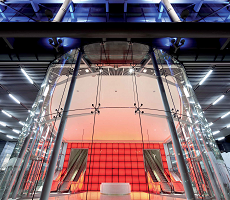September 29, 2014
The weekly Insight newsletter is now available to view online
 In the latest edition of the weekly Insight newsletter, now available to view online; Mark Eltringham describes some of the most readily identifiable themes at this year’s 100% design, while Sara Bean hails Richard Branson’s adoption of a flexible working policy for his personal staff. The British Council for Offices (BCO) launches the much awaited new edition of its Specification Guide; a new report from the World Green Building Council (WorldGBC) claims “overwhelming evidence” that office design significantly impacts the health, wellbeing and productivity of staff; and research by Steelcase discovers nearly a third (31%) of occupants now routinely leave the office to get work done in private. Justin Miller discusses the challenge of balancing sustainable building design with the need to ensure a comfortable workplace; and from the latest issue of Work&Place, the journal we publish in partnership with Occupiers Journal, Dr. Agustin Chevez lists the thirteen ways the physical environment shapes knowledge management .
In the latest edition of the weekly Insight newsletter, now available to view online; Mark Eltringham describes some of the most readily identifiable themes at this year’s 100% design, while Sara Bean hails Richard Branson’s adoption of a flexible working policy for his personal staff. The British Council for Offices (BCO) launches the much awaited new edition of its Specification Guide; a new report from the World Green Building Council (WorldGBC) claims “overwhelming evidence” that office design significantly impacts the health, wellbeing and productivity of staff; and research by Steelcase discovers nearly a third (31%) of occupants now routinely leave the office to get work done in private. Justin Miller discusses the challenge of balancing sustainable building design with the need to ensure a comfortable workplace; and from the latest issue of Work&Place, the journal we publish in partnership with Occupiers Journal, Dr. Agustin Chevez lists the thirteen ways the physical environment shapes knowledge management .























July 31, 2014
Yet another report into the Future of Work that is really about the present
by Mark Eltringham • Comment, Flexible working, Technology, Workplace design
(more…)